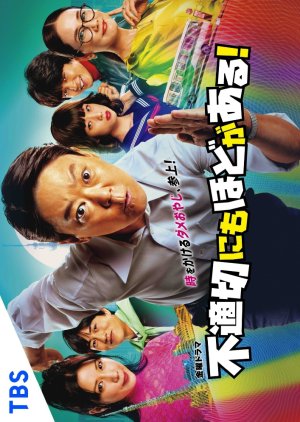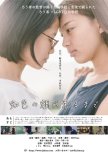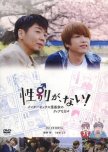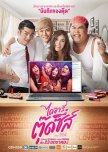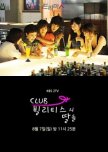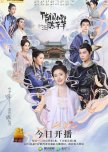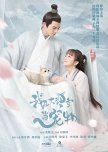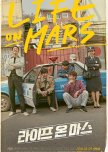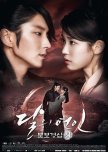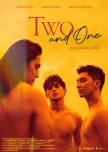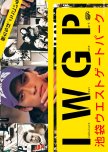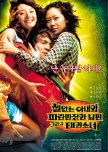
showa chome chome wok party
L'incroyable quantité de productions faisant la part belle aux voyages dans le temps me rend extrêmement méfiant face aux plagiats du seul chef d'œuvre du genre: la série des "Retour vers le futur". Mais le parti pris de Futekisetsu ni mo Hodo ga Aru ! donne vraiment envie de repousser les limites du genre. Entre Mama Mia, le film, pour tout un tas de raisons, et une plongée nostalgique dans le meilleur de l'ère Showa: les peu recommandables années 80.Ewook-isme
Le réalisateur de l'excellent Ore no ie no Hanashi c'est une nouvelle fois donné à cœur joie, pour dépeindre la famille japonaise et la société d'aujourd'hui en nous faisant rire, pleurer et interroger sur ses dérives . "D'aujourd'hui", car c'est à travers le prisme des années 80 que le wokisme associé, la retenu dans les sentiments et l'honnêteté nous sautent au visage comme un diable qui sort de sa boite.
Le pire contre-attaque.
Dans Ore no ie no Hanashi, Nagase Tomoya incarnait avec beaucoup d'humour et de tendresse un fils qui aurait pu renoncer à ses rêves au vu du poids d'une succession et de traditions familiales. Ici, Abe Sadao nous donnera tout autant d'émotions positives en incarnant ce père veuf et fou de sa fille (à l'instard de l'excellent Oyabaka Seishun Hakusho), éprise de liberté dans ces années de folie qu'on été la fin de l’ère Showa. Alors que le paternalisme semble poussé à l'extrême, on se délecte de voir les comparaisons avec le monde "dit" moderne et cette sensation que Abe Sadao est un homme de Cro-Magnon dans le Tokyo de 2024. Mais loin de vouloir répéter les leçons assenées quotidiennement dans les médias depuis "me too" à grand coup de "c'est mieux maintenant, mais le combat continue", on progresse dans les épisodes, en changeant régulièrement d'opinion sur ces deux périodes, celle d'aujourd'hui et celle de de papa. Même si je reste attaché à la période qui m'a vue grandir, celle de la Famicon et de Dragon Ball, le paternalisme et la place de la femme dans la société n'ai pas a regretter. À part pour quelques autoproclamés masculinistes, trop chouchoutés par leur maman et admirateurs d'un père vautré sur le canapé, laissant madame faire toute seule la vaisselle, l'éducation et les courses. Les travers de notre société, comme l'isolement, le refoulement des sentiments, l'incapacité de donner opinion et nos envies sans la peur d'être juger et le lissage permanents des différences nous devient tellement étouffants à travers le prisme de ce 50naire aux idées bien arrêtées.
Humour et Karaoke
Les situations de quiproquos sont nombreuses. Sans compter le choc quasi culturel entre les japonais de 1986 et 2024. Les profs fument (et pas qu'un peu) devant les élèves dans les salles de classe. Les brimades sont permanentes. En particulier de la part des aînées (professeurs, senpaïs, ... ) et remettent un peu en perspective le flot incessant de situation de harcèlements "made in 2024" C'est au départ ce qui m'a le plus choqué et j'en ai un peu honte. Les pseudo-potiches en permanence en maillots de bains dans les émissions TV, mon effectivement, moins posé problème. Mais heureusement certains personnages nous rappellent à l'ordre. Le corps de la femme comme un produit à mis du temps a disparaître. Mais a-t-il seulement disparu ou pris une autre forme plus pernicieuse ? Vous l'avez compris c'est avec humour et une certaine forme d'art que les messages passent dans cet également excellent brûlot du showbiz actuel. Et tout comme Oshi no Ko, c'est en chanson que l'art et la critique s'expriment le mieux. Au delà du Karaoke, chaque épisode est parsemé d'un Omake rappelant toutes sortes de comédies Musicales, Mama Mia ou La La Land en tête. La production prend des risques, en introduisant de longs moments chantés. Mais aussi sur l'utilisation sans filtre du vocable des années 80. Même si le wokisme revient toujours par la petite porte, avec de très présents avertissements textuels, s'excusant d'utiliser ce vocabulaire. À moins que ce soit encore pour ce moquer du wokisme. Vous apprendrez donc tout un tas d'expressions, comme Chome Chome, qu'il faudra utiliser avec prudence en 2024. Mais loin de la lourdeur attendue aux vus de ces derniers mots, vous comprendrez que les apparences sont trompeuses, comme dans ce scénario alambiqué qui fait à lui tout seul le sel de cette excellente comédie.
Cet avis était-il utile?

A Time-Travel Musical About Cultural Change
It's no Crazy Ex-Girlfriend, and it's no Back To Future. But Extremely Inappropriate is, indeed, a weekly musical involving a very limited form of time travel. Written by the extremely well-lauded Kankuro Kudo, the series grapples with current social hypersensitivity and conformity which has been intensified in at least some cases by social media. The initial impression of the series is that it's positing the idea that people back in the good old days (1986) would be able to cut through all the woke bullshit and restore some kind of social sanity to the ridiculous limitations imposed of today (2024) by SJWs and their ilk in business and entertainment media. But that position is a bit of strawman that Kankuro attempts to pull apart in the course of the series.And so takes he the most obliviously sexist and abusive archetype he can think of, a high school PE teacher from 1986 (Ogawa Ichiro played by Abe Sadawo) and has him get on a bus to 2024. Simultaneously, a feminist sociologist (Sakae played by Yoshida Yoh) and her teenaged son (Kiyoshi played by Sakamoto Manato) are brought on the same bus from 2024 to 1986. Hijinks ensue in both time periods as the bus runs its route on Saturdays.
In 2024, Ogawa immediately falls upward in the business world by saying things that cannot be said in the current culture and ends up as the counselor in the standards and practices department of a large broadcast television network which allows the series to address various forms of social policing across the episodes. Meanwhile, Sakae and Kiyoshi are confronted by the old-school sexism and systemic repressions of 1986 while living with Ogama's daughter Junko (played by Kawai Yuumi).
If you are put off by musicals, you might still find this series tolerable. Each episode does contain singing and usually a production number, but they last no more than maybe 3 to 5 minutes of the total runtime of the episode. The songs are not terribly memorable, and, indeed, pale in comparison to the maybe two songs in Kankuro's asadora Amachan from 2013. However, the entire cast are surprisingly good singers and seem to relish their chance to use that skillset in this series. I genuinely recommend Abe's turn as a heavy metal singer in the 2018 film Louder!: Can't Hear What You're Singin', Wimp if you find you enjoy his singing as Ogawa in this series.
The time travel here is no more than a narrative device, and there really is no intention to explore paradox or establish any of the usual variants of timelines and their consequences. A handwavy shock occurs between characters if they are about to do something will cause a change in the timeline (except what it really prevents in the one instance that it happens is something else entirely that really does not involve a potential paradox). Characters go back and forth between the two eras in a completely chronological order mostly to see the differences in the culture that have occurred in that 38 years.
And so if it's not a great musical and it's not a great time travel story, why watch this series? The answer is: for the characters. Ogawa has a lovely shift in attitudes and understanding through his adventures in his future. His daughter Junko sees a world of possibility open up for herself when she sees the way the culture will change. The widowed Oagawa's love interest in the future, Nagisa (played by Naka Riisa), learns more about herself and her family. There are a lot of interesting and fun side characters as well as is usual in Kankuro's work including a self-insert of a television writer in a couple of the episodes.
I'm pretty sure the social critique did not work as well as intended, but I did grow to love these characters. I particularly liked Kawai's Junko though it's Naka's Nagisa that gets to do the heavy lifting in the series which she does with a deft comedic flare.
The final song of the series is a plea for tolerance, but, honestly, Kankuro's comedic study of guilt, atonement and forgiveness Saving My Stupid Youth (also currently on Netflix) from 2014 is much more insightful. I rate that and his Story Of My Family from 2021 (and also on Netflix) a bit higher than this series, but I do think this series is still well worth the watch.
Cet avis était-il utile?

Are you curious of Japan in the 1980s? Watch it! A very amusing time traveling musical drama!
This is a total hit drama depicting very true some of social stigma and issues in Japanese modern society like gender equality, generation gap, work place culture, school quitters, women career after maternity leave, social networking abuse etc. As an adult working in Japan right now, I can guarantee that the drama’s portrayal of the above issues are very spot-on one can easily relate to it!And gosh, it’s been such a long time I laughed till my stomach hurts watching a drama!
Being partially musical maybe a turnoff to some but imo, the show brings life and relieve to the tension induced when touching serious social issues so it can keep the overall light-hearted and comical mood of the drama.
With all the social issues brought on the table, the drama still manages to weave in a touching and full of surprise family story of the main characters in the backdrop of time traveling as to balance out the seriousness and to keep the viewers engaged.
The cast performance is applaudable as expected from a Japanese drama. Abe Sadao, the male lead actor here is quite famous for his comical but heartwarming images and he certainly plays it well here. Kawai Yukimi, the actress playing Junko is relatively new to me but her performance here is quite impressive!
Satirical, comical, witty, light-hearted yet heart-warming and somewhat nostalgic, this is definitely on my recommendation list for drama! It’s been a while I’ve met a drama like this! Feeling my love for Japanese drama and its satire all over again!
Though the modern social issues brought here are more relevant in Japanese modern society, some of it can be resonated in other modern society context as well.
It is definitely a good watch and especially so if you are curious about Japan in the 1980s and Japanese work place & broadcasting station. If you need to do some research about how Japanese social issues reflected in drama, this is definitely a must-watch! :)
Cet avis était-il utile?

Cette critique peut contenir des spoilers
..YOU MIGHT THINK IF GOING FOWARD TO FUTURE OR GOING BACK IN THE PAST IS GOOD..
..the synopsis indeed caught my attention with some familiar faces (esp. Riisa Naka and Isomura Hayato) with new faces on the casts....
..the first episode itself really gives me more attention to watch the next episode and the next..
.
..i do love the musical part that for me, it summarizes the whole story of each episode - plus the choreography at the same time..
.
..traveling to the future will give you a shock that you better not change it the past (if time travel is true)..
.
..i love the effort of the people behind the subtitle part to put every single details just to understand some terms that the characters saying..
.
..no dead minute on the whole episode since all the emotion are out unto it plus the lesson you may learn and the character development happened esp. in the episode (which i am looking forward), like a fairy tale, they all live happily ever after..
.
..the drama highlighted the different era's political view, fashion and lifestyle, which really changed from one era to era knowing if the past can still be adapt in the future vice versa..
.
..overall i love this drama, so unique, must-watch..
Cet avis était-il utile?
Too much, but art
A first episode absolutely great. The disclaimers at start and end of the episode make it even more funny and inciting to think!Also the following few episodes are great. Though I think they overdo it and at some point the writer was clueless aht to do next.
Well, this confusion is typical for very good art, so I do not complain about it. Every little detail is well sought. The acting is also great. Yet thereis os much input that it becomes overwhelming, After the half of the episodes I found myself struggling to follow it. In my opinion there were too many allusions to TV shows and alike from the older time.
In a word, it is worth starting, but after seeing 50% of the episodes you can simply stop watching it, if you don't want to waste your time.
Cet avis était-il utile?

Refreshing Plot and Hilarious!!
Definitely peak of Jdrama overall.. Masterpiece!! The plot, the acting, the script, the camera work.. Everything is perfect ^_^ Hats off to Director and Screenwriter Kudo Kankuro.. His comedy works never fail me like Unubore Deka, Gomen ne Seishun! Lets Get Divorced, Ore no Ie no Hanashi..This drama once I start watch, I can't stop.. I didn't expect the singing part xD comedic musical xD Definitely caught me off guard.. Its funny and watching it, its crazy how everyone offended with everything xD
Everyone including supporting casts really shine portrayed their role.. No loophole acting and plot.. Well written plot and I love everything about this drama ^_^ its a MUST watch
Cet avis était-il utile?

